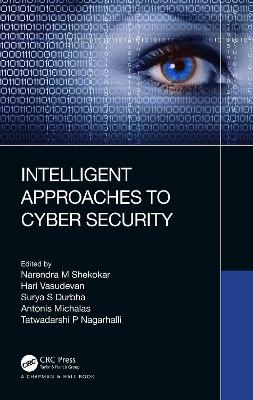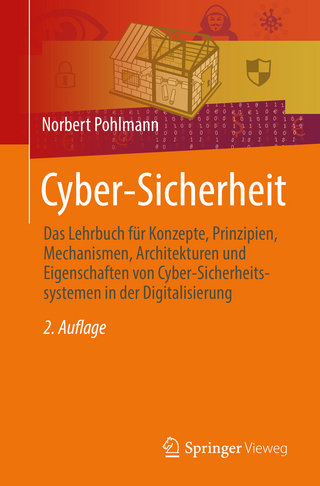
Intelligent Approaches to Cyber Security
Chapman & Hall/CRC (Verlag)
978-1-032-52161-9 (ISBN)
Features:
Role of Deep Learning and Machine Learning in the Field of Cyber Security
Using ML to defend against cyber-attacks
Using DL to defend against cyber-attacks
Using blockchain to defend against cyber-attacks
This reference text will be useful for students and researchers interested and working in future cyber security issues in the light of emerging technology in the cyber world.
Dr. Narendra Shekokar has received his PhD in Engineering (Network Security) from NMIMS University, Mumbai and he is working as a Professor, Dept. of Computer Engineering and Head, Dept. of IoT and Cyber Security with Blockchain Technology at SVKM’s Dwarkadas J. Sanghvi College of Engineering, Mumbai (Autonomous college affiliated to Universy of Mumbai). He was a member of Board of Studies at University of Mumbai for more than 5 years, currently working as Dept. Advisory Board at Various Institutes and also been a member of various committees at University of Mumbai. His total teaching experience is 25 years. Dr. Narendra Shekokar has guided 4 research fellow and currently 6 Research fellows are registered with him. He has also guided 26 students at Post Graduation level. He has presented more than 65 papers at International & National conferences and has also published more than 20 research papers in renowned journals. He is Editor of two renewed Book in ML & DL and Cyber Security domain published by Taylor and Francis, CRC Press, USA. He has received the Minor Research Grant twice from University of Mumbai for his research projects. He has delivered expert talk and chaired a session at numerous events and International conferences. Dr. Hari Vasudevan is the Principal of SVKM’s Dwarkadas J. Sanghvi College of Engineering, Mumbai, an Autonomous institution affiliated to the University of Mumbai. He is working as the Principal of the college since February 2009. He has a Ph.D. Degree from IIT Bombay and a Master of Engineering degree as well as a Post Graduate Diploma in Industrial Engineering from VJTI, University of Mumbai. Dr. Hari is a certified ERP Consultant from S.P. Jain Institute of Management & Research, Mumbai under the University Synergy Programme of BaaN Institute, Netherlands. He is a member of the Research & Recognition Committee (RRC) of the University of Mumbai in Mechanical Engineering as the internal expert of the University. He is also the Chairman of the Board of studies in Production Engineering of the University of Mumbai. He has over 29 years of experience in teaching and 2 years of experience in Industry and his areas of interest include Digital Manufacturing, Cyber Security in manufacturing and Manufacturing Strategy. He has published over 132 Research papers in International Journals and Conferences as well as in National Journals and Conferences and has published textbooks, textbook chapters, workbooks and articles in various News Letters. He is a recognized Ph.D. guide at the University of Mumbai as well as at the NMIMS (Deemed to be University) in the field of Mechanical Engineering. 8 students have so far received their Ph.D. degree under his guidance. He is currently guiding 5 more Ph.D. students under the DJSCE Research Centre of University of Mumbai. He has 6 Indian design and 2 process patents to his credit and has received many awards and accolades from various national level organizations in the past. Dr. Hari Vasudevan is a Fellow of the Institution of Engineers India and is currently the President and Fellow of Indian Society of Manufacturing Engineers, Mumbai. Dr. Surya Durbha has received his PhD in Computer Engineering from Mississippi State University (MSU), USA. He is working as Professor in Centre of Studies in Resources Engineering (CSRE), Indian Institute of Technology Bombay (IIT-Bombay). He has more than 20 years of experience. He has won a number of awards including the best paper award in an international conference on geoinfomatics, Outstanding Research Award (HM) (2008), GRI, Mississippi State University, State Pride Faculty Award (2010), Mississippi State University, Excellence in Teaching award, IIT Bombay and NVIDIA Innovation award by NVIDIA. He is a reviewer for many prestigious journals including IEEE Geoscience and Remote Sensing, IEEE Journal of Selected Topics in Applied Earth Observations and Remote Sensing, and Geoinformatica, among others. He has guided more than 6 PhD and 24 M.Tech students. He also has many research paper publication in prestigious journals and conferences. Dr. Antonis Michalas has received his PhD in Network Security from Aalborg University, Denmark and currently he is working as an Assistant Professor at the department of computing Science at Tampere University of Technology, faculty of Computing and Electrical Engineering. Prior to this, he was working as an Assistant Professor in Cyber Security at the University of Westminster, London. Earlier, he was working as a postdoctoral researcher at the Security Lab at the Swedish Institute of Computer Science in Stockholm, Sweden. As a postdoctoral researcher at the SCE Labs, he was actively involved in National and European research projects. Mr. Antonis has published significant number of papers in the field related journals and conferences and have also participated as a speaker in various conferences and workshops. His research interest includes private and Secure e-voting system, reputation systems, privacy in decentralized environments, cloud computing, trusted computing and privacy preserving protocols in participatory sensing applications. Dr. Tatwadarshi P. Nagarhalli is working as an Associate Professor at Vidyavardhini’s College of Engineering and Technology, Vasai, Mumbai. He has 2 PhDs, in Computer Engineering and Sanskrit. He has over 10 years of experience, including 2 years of Industry experience. His area of interest includes Data Security, Machine Learning, Natural Language Processing, and Artificial Intelligence. He has taken subjects like Machine Learning, Advance System Security and Digital Forensics, Artificial Intelligence, Natural Language Processing, Applied Data Science and Mathematics in AI-ML. He has served as a Panel Member for the Syllabus Design of Machine Learning, Deep Learning, Natural Language Processing, and Artificial Intelligence at the University Of Mumbai. He has presented and published more than 55 Research Papers in reputed conferences and journals (SCI and Scopus Indexed) like IEEE and Springer. He has served as an editor of the book titled ‘Cyber Security Threats and Challenges Facing Human Life’ published by CRC Press, Taylor and Francis group. He has also authored many book chapters with reputed publishers. He has received the Best Paper Award for a Data Security paper at an International IEEE conference. He has 2 patents published, one of which is on Data Security. He has 5 software / literary copyrights to his credit as well. He is the founder and has worked as the editor-in-chief of a Non-Profit International Journal indexed in a few reputed databases. He is also an active reviewer of reputed Scopus Indexed journals like the IEEE Access and Journal of King Saud University – Computer and Information Science. He is a lifetime member of the Indian Society for Technical Education. He has undertaken many workshops and training programs at UG and PG levels for industry and academia.
Section 1: Introduction to ML in Cyber Security
Introduction and Importance of ML techniques in Cyber Security (to be written)
Review of Machine Learning approaches in the Field of Healthcare
Scope of Machine Learning and Blockchain in Cyber Security
Section 2: Defending Cyber Attack using Machine Learning
Detection of Spear Phishing using Natural Language Processing
A Study of Recent Techniques to detect zero-day Phishing attacks
Analysis of Intelligent techniques for Financial Fraud detection
Evaluation of Learning Techniques for Intrusion Detection System
Section 3: Defending Cyber Attack using Deep Learning
Deep Neural Networks for Cybersecurity
Deep Learning in Malware Identification and Classification
Section 4: Defending Cyber Attack using Advance Technology
Cyber threat mitigation using Machine Learning, Deep Learning, Artificial Intelligence, and Blockchain
Behavioral Monitor and Blocker of a Cyber Malware using Block chain, Machine learning and VAPT
Quantum Safe Cryptography
| Erscheinungsdatum | 13.10.2023 |
|---|---|
| Zusatzinfo | 27 Tables, black and white; 55 Halftones, black and white; 55 Illustrations, black and white |
| Sprache | englisch |
| Maße | 156 x 234 mm |
| Gewicht | 550 g |
| Themenwelt | Informatik ► Netzwerke ► Sicherheit / Firewall |
| Mathematik / Informatik ► Informatik ► Software Entwicklung | |
| Informatik ► Theorie / Studium ► Künstliche Intelligenz / Robotik | |
| Technik ► Elektrotechnik / Energietechnik | |
| Technik ► Umwelttechnik / Biotechnologie | |
| ISBN-10 | 1-032-52161-9 / 1032521619 |
| ISBN-13 | 978-1-032-52161-9 / 9781032521619 |
| Zustand | Neuware |
| Informationen gemäß Produktsicherheitsverordnung (GPSR) | |
| Haben Sie eine Frage zum Produkt? |
aus dem Bereich


